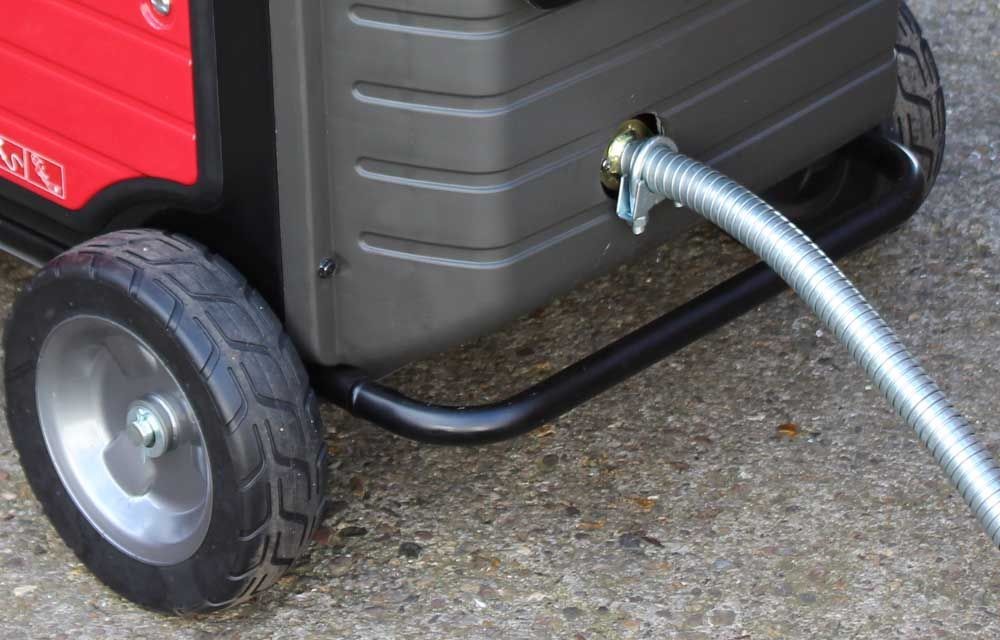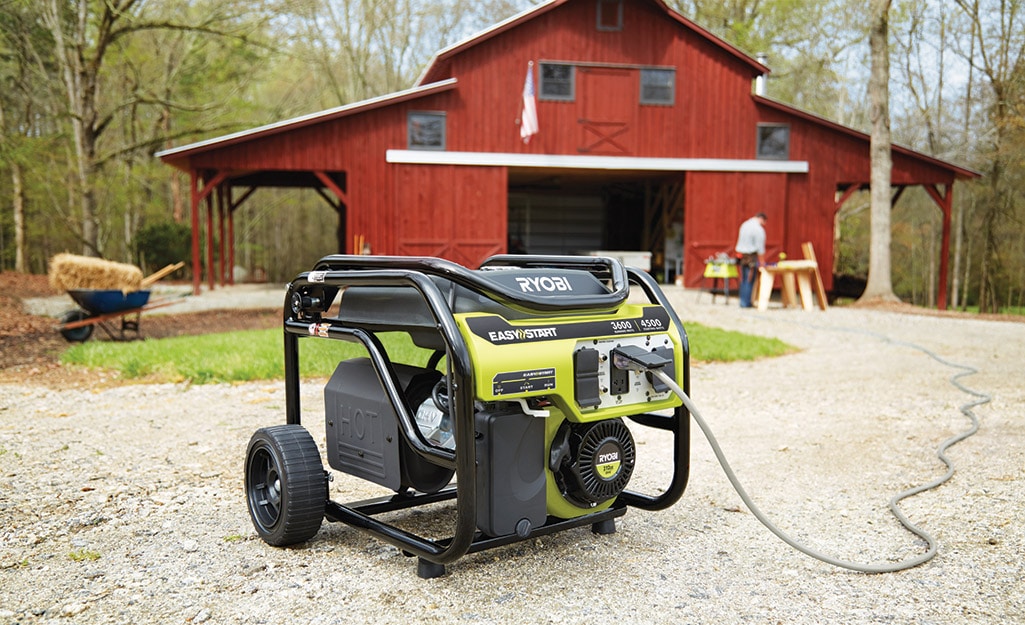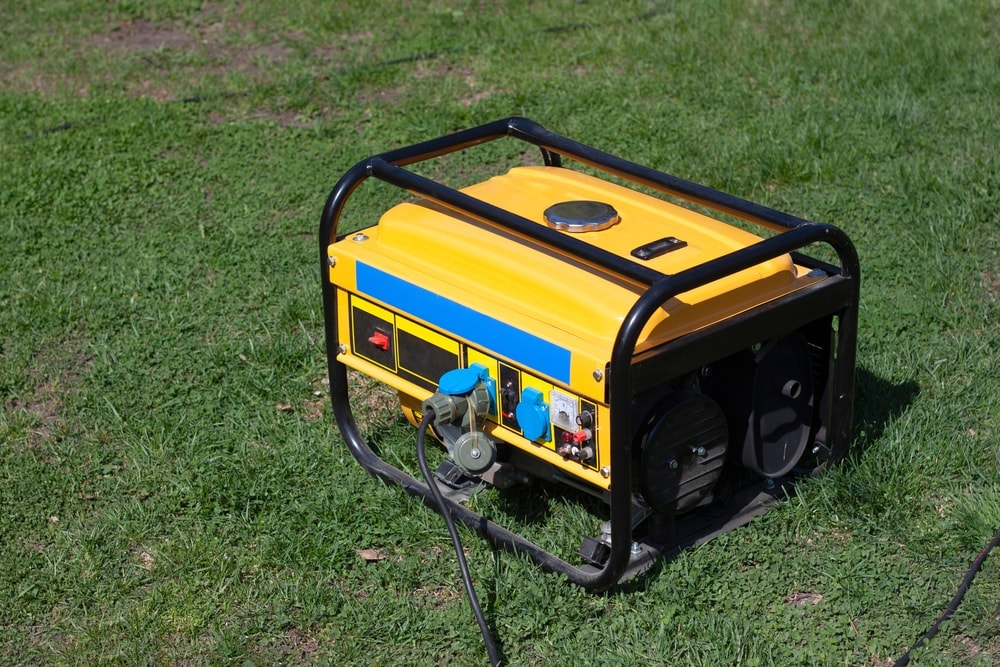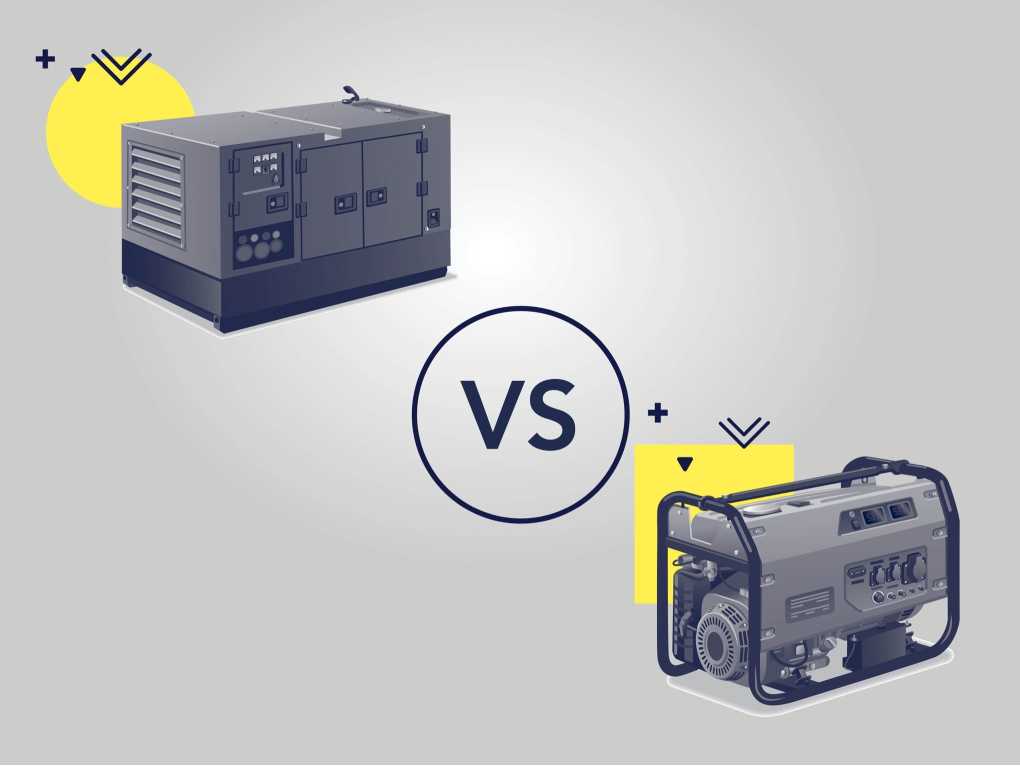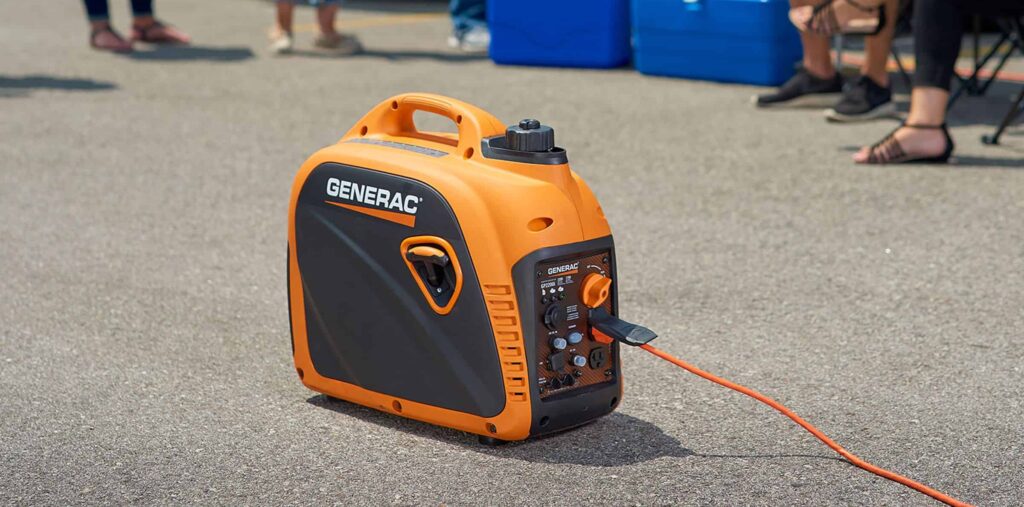A tri-fuel generator is one of the most important pieces of equipment you can have when disaster strikes and the electricity goes out. During these times, gasoline lines are likely to be extremely long and prices will be high, so having a generator that can run on alternative fuel sources can save you time, money, and frustration. A tri-fuel generator is a particularly good choice, since in addition to running on gasoline to provide electricity to your home and essential appliances, these generators can run on either propane or natural gas.
The best tri-fuel generator needs to be highly reliable and able to crank out the wattage that you need to power everything you’re likely to need in an emergency situation – from your refrigerator and freezer to your air conditioning if it is excessively hot out, to your phone and computer so you can connect with the outside world. In our review of the best tri-fuel generators, the continuous and surge outputs of different generators, especially when using different fuel sources, was one of our top considerations. We also considered the number of power outlets that each generator provided and specifications like the manufacturer’s warranty.
We spent hours reading through customer reviews and technical specifications for some of the most popular tri-fuel generators to separate out the very best. The result is six top picks that cover a range of needs and budgets. Our favorite tri-fuel generators are highlighted in the table below – keep reading for detailed reviews of each generator, complete with pros and cons. Our buying guide and FAQs cover everything you need to know about tri-fuel generators so that you can choose the generator that is best for your home. Finally, we summarize our three favorite tri-fuel generators on the market today.
More features: battery and LPG/natural gas regulator included
This Wanco generator from Smart Generators is not the most powerful tri-fuel generator we reviewed, but it was among our favorites thanks to the quality and performance. The generator produces 7,000 watts of continuous power when running on either gasoline or propane, but doesn’t lose much power when switching to natural gas – it can still put out 6,500 watts. The 14 horsepower Kohler engine is quality all around and will last for years to come. While it is not designed to be the quietest among engines we looked at, at 72 dB, it comes with a low oil shut off safety feature and is backed by a three-year warranty.
Users loved the automatic voltage regulator system, which keeps the output voltage of the 120V outlets within 6% of their rated voltage. That means that this generator is powerful enough to run a few refrigerators while also powering your delicate electronics like smartphones and computers. The generator face includes four 120V outlets, as well as two twist-lock outlets for running large appliances or even using this with an RV.
Another thing that users appreciated about this generator is that it comes with almost everything you need. The package includes not only the generator, but also the wheel kit, a battery, and a regulator for using a propane canister or natural gas.
More features: included battery with charger and 10 foot long propane hose
Given that Smart Generators was already adding Kohler-brand engines into many of their top-end generators, it only makes sense that they made a Kohler-brand generator itself. This generator uses the same 14 horsepower motor found on the Wanco WGCT7500, but outputs a hefty 9,000 surge watts when running on gasoline or propane. However, note that the continuous wattage drops significantly to 7,200 watts on these fuel sources, and to 6,700 watts on natural gas – so that extra power is most helpful if you plan to be running several large motor-driven appliances and to be using the generator near its maximum continuous wattage.
Like the other tri-fuel generators made by Smart Generators, this unit comes with automatic voltage regulation to enable you to safely power your delicate electronics. The front panel looks much the same as on the Wanco generators, providing versatility for charging anything around your home as well as powering RVs and powering car batteries through a DC outlet. The unit also includes a battery and a 10-foot hose to connect to a propane tank, which are welcome additions given the high price of the generator. The generator comes with a three-year warranty to provide peace of mind on your purchase as well.
More features: EPA & CARB (California) approved, automatic low oil shut down
This moderately priced tri-fuel generator from Sportsman is a great compromise for those who need a significant amount of power but don’t want to spend a fortune. The generator provides up to 9,000 watts of surge power on gasoline and 7,200 watts of continuous power, while the 7.4-gallon fuel tank allows it to run for a full 10 hours at half power before needing to refuel. The 15 horsepower engine is certified by the California Air Regulations Board and has a low oil shut off to protect against damage. However, note that the generator does not come with a battery, so you’ll need to purchase one after-market in order to start the engine using the electric start rather than the recoil option.
At only 200 pounds, this generator is among the lightest tri-fuel generators we reviewed and comes mounted on a wheel kit. Plus, unlike generators from Winco it has a 120V 30A twist-lock outlet for providing power to an RV. The downside to this generator is that it does not have an automatic voltage regulator system built-in, so be very careful when using this generator to power devices like your smartphone and computer.
More features: clean electricity, low oil shut off, durable
This Wanco-line generator from Smart Generators is essentially the little brother of the other tri-fuel generator from Wanco that we reviewed highly. Instead of boasting a hefty 7,000 watts on gasoline and propane, this generator offers 4,800 watts of continuous power and 5,300 watts of surge power. The engine is also correspondingly smaller, at 9.5 horsepower, but comes with the same quality that Kohler is known for. It is also built with a low oil shut off feature for safety and comes with the same three-year commercial warranty that users appreciated.
The generator also comes with the same automatic voltage regulator system, which means that this generator can be used to power your smartphones and computers without experiencing dangerous power surges. Despite the smaller wattage of this generator, it comes with the same set of handy outlets so that you can run a wide range of devices all at once. However, note that with the lower continuous output power, the wattage drawn by these small electronics can quickly add up and stall the generator if you have two large appliances running at the same time.
While this generator does come with a wheel kit, note that unlike the more expensive Wanco generator it does not come with a regulator for using propane or natural gas – you will need to factor this in when considering the budget price of this unit.
More features: easy to move and store, 7 gal. fuel tank capacity
This tri-fuel generator from Winco is designed to provide serious power in a compact body – it is rated for 9,000 watts of surge power and 8,000 watts of continuous power, although Winco does not specify what the rated power outputs are when running on natural gas. The 16 horsepower engine is extremely powerful, although also quite loud, and comes with a competitive three-year warranty for peace of mind. The generator is built with a seven-gallon fuel tank, which when running at full capacity will provide about five hours of runtime or about seven hours when using the generator at half load.
Despite the compact design, this generator is still not lightweight at over 270 pounds. Plus, note that you’ll need to buy a wheel kit separately in order to be able to easily move it around. Combined with the lack of a second 120V 30A twist-lock outlet – the kind of outlet that most RVs use – this unit may not be the best choice for those in need of a highly portable generator. However, the small overall dimensions do make it great for storing it in the garage when you are not using it.
More features: EPA certified, 15 gal. fuel tank
If you need serious power above all else, then look no further than this tri-fuel generator from Winco. This generator is about as heavy-duty as they come, with a surge power output of 12,000 watts and a continuous power output of 10,800 watts when running on gasoline. Although that drops significantly to 9,000 surge watts and 7,200 continuous watts on natural gas, those ratings are still higher than for nearly any other tri-fuel generator currently on the market. Plus, the Honda engine comes with a two-year warranty to protect your investment in this generator.
Despite all that power, the generator has a built-in capacitor to provide automatic voltage regulation so that you can easily power your delicate electronics as well as your power-hungry appliances. Despite all the output power of this generator, it is relatively limited in the number of outlets it provides – it has the standard four 120V outlets, but only one 30A twist-lock outlet. Note also that this generator is not certified by the California Air Regulation Board (CARB), which means that consumers in California cannot legally operate this generator – and other users may note that the generator does release a small amount of smoke and smog.
Now that you’ve learned more about our six favorite tri fuel generators currently on the market, how do you choose among them to find the tri fuel generator that matches your needs and budget? Let’s find out!
Is a tri-fuel generator the right choice for you? Given that there are traditional generators that run only on gasoline and dual fuel generators that run on either gasoline or propane, this largely comes down to whether or not the added ability to run your generator on natural gas is important to you.
First off, there are numerous advantages to being able to run your generator off of propane or natural gas rather than gasoline. Gasoline is typically more expensive than either propane or natural gas, and unlike the latter two fuels it will go stale after only a few months. That means that gasoline is a difficult fuel to store if you are keeping an emergency fuel supply in your basement or garage. In addition, in the event of a disaster – when you most need fuel to power your generator – gasoline is the most difficult of these fuels to get. Long lines and high prices are common as gas stations, whereas propane is often in ready supply at stores and natural gas lines often remain intact. Propane and natural gas also burn more cleanly in your generator’s engine compared to gasoline, which means that your carburetor won’t get gummed up as quickly from use and your generator will last longer.
The downside to switching away from gasoline? Lost power. Gasoline typically provides significantly more continuous and surge wattage than natural gas, so keeping gasoline around can be important if you are planning to run numerous high-wattage appliances such as an air conditioner or electric heating system. While on many dual fuel generators gasoline offers higher wattage than propane as well, on most tri-fuel generators gasoline and propane are rated to provide the same amount of power.
The advantage of a tri-fuel generator over a dual fuel generator lies in the added ability to burn natural gas. Although natural gas typically offers the lowest wattage compared to propane and gasoline, natural gas is often the easiest fuel to obtain since most houses have natural gas lines running into them. In most weather-related disasters, these underground natural gas lines remain unaffected – so you can essentially have a cheap, limitless fuel source running into your generator without the need to store fuel at your house or wait in long lines for gasoline or propane.
The main downside to tri-fuel generators is that they are typically more expensive than comparable dual fuel generators. They are also somewhat heavier and – by virtue of being connected to a natural gas line – less portable, so they are not the generator of choice for camping or work sites in most cases.
Since a tri-fuel generator is a big investment that should last for years to come, it’s important to think about the ways in which you are likely to use it and match those needs to the specific features of different generators. In our buying guide, we’ll cover everything you need to know about what differentiates tri-fuel generators from one another so that you can make an informed buying decision. We’ll also go into detail about why a tri-fuel generator may or may not be the right choice for your home and emergency power needs.
The most important specification to pay attention to when you are choosing any generator – whether a traditional generator or a tri-fuel generator – is the continuous and surge wattage. The continuous wattage is the amount of power that your generator can run continuously, while the surge wattage is the power the generator can output for 2-3 seconds when starting a motor-driven appliance such as an air conditioner or refrigerator, since motors require more power to start than to run them continuously.
On a tri-fuel generator, these rated wattages vary depending on which fuel type you are using. Gasoline provides the highest output wattages – both continuous and surge – while propane provides an equivalent or slightly lower power output. Operating your generator with natural gas typically entails a slight power decrease.
How much power do you need? The answer depends on what devices and appliances you are planning to run using your generator and what fuel source you are most likely to turn to. The continuous output wattage of your generator should be higher than the sum of the required wattages of all the things you plug into it – if this rating is exceeded, the generator will stall. However, be sure to take note of whether any of your appliances – like your refrigerator or air conditioner – have additional surge wattages, since you will need to ensure that the surge wattage on your generator is able to handle this in addition to the continuous wattage being drawn by whatever else you have plugged in.
The engine is also an important consideration here, since this is the part of the generator that is driving the output wattage and fuel efficiency.
The horsepower of tri-fuel generator engines varies greatly among models, and higher horsepower is not always better, since these engines may be louder or less efficient. Most important is the engine’s efficiency, which varies by model and requires doing some research into the generator you are interested in.
Some, but not all, tri-fuel generators come with an automatic voltage regulator, or AVR, system built into the generator. This system, which is found on the Wanco and Kohler generators that we reviewed, monitors the voltage being output by the generator and keeps it within a small range of the rated output voltage of the outlets on the generator’s face. This system is extremely important if you plan to power sensitive electronics, like computers and smartphones, using your generator’s outlets since a small surge in voltage can damage the circuit boards in these devices. However, an AVR system is not required for most large, motor-driven appliances like a refrigerator.
The number and types of power outlets that are built into the face of your tri-fuel generator determine how many appliances and devices, and to some extent which appliances and devices, you can power off of it. Most generators come with at least four household-style 120V outlets, which are used for powering the vast majority of devices. Also important, though, are twist-lock style 120V/240V outlets, since these are required for some large appliances such as refrigerators and freezers. Few tri-fuel generators come with USB charging ports, although these can be somewhat useful for charging small electronics that draw relatively few watts.
The capacity of the fuel tanks matters primarily if you will be powering your tri-fuel generator with gasoline, since propane comes in its own tank and natural gas is provided through pipelines. The volume of fuel tanks varies greatly among generators, from 15 gallons to only seven gallons on the Winco generator, and is one of the major contributors to how large a tri-fuel generator is. While the fuel tank capacity will determine how frequently you need to add gas to the generator, having a small tank should not be a limitation since you will need a plastic gasoline canister to store extra gasoline in any case.
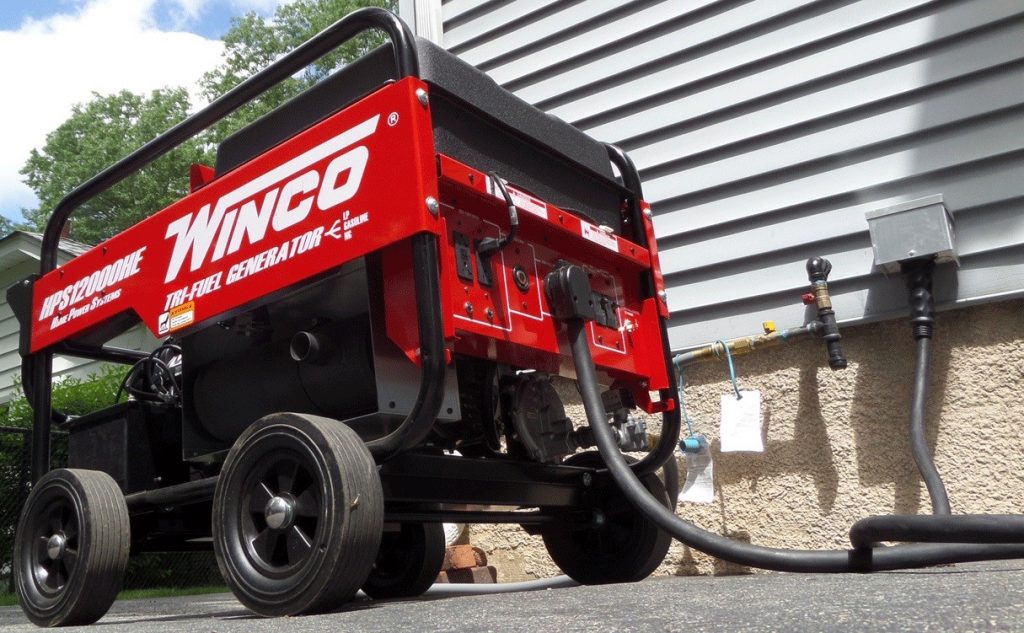
In addition to features like the automatic voltage regulator system, many tri-fuel generators come with built-in safety feature like a low oil shut off. This type of shut off is important for protecting both your generator’s engine and your appliances, since low oil can damage the engine and cause wild fluctuations in the output wattage of your generator.
While your generator can function as-purchased in most cases, you are likely to need a few small accessories – which may or may not be included with your generator. A wheel kit is essential for making it easy to move your generator around the house, which can be important if you need to switch between a fixed natural gas line and a safe spot to burn propane or gasoline. In addition, you will need a regulator in order to use propane or natural gas – while some tri-fuel generators provide this, not all do. Finally, running your generator off of propane will require a tubing line to connect the propane tank to the regulator, which is often not provided with the generator itself.
A tri-fuel generator is a significant investment, and you should have the expectation that it will last for years to come when you make your purchase. Many manufacturers offer limited warranties on their generators in order to provide peace of mind, although these warranties vary significantly in length – from the three years offered by Wanco and Kohler to the one year offered by Sportsman – and the issues that they cover. Be sure to check not only on the length of the warranty but also on whether other customers have had success in working with the manufacturer to call it in.
Additional features, such as certification by the California Air Resources Board, can be important if air quality is a concern. Good customer service by the manufacturer is also a major selling point, since this provides some strength behind the warranty on your generator.
Did you know that you can run a generator on natural gas, low-pressure propane or gasoline without buying a tri-fuel generator? All you need is to get a special-purpose conversion kit compatible with your generator. There are kits designed for Durostar, Honda, and more.
In our Frequently Asked Questions section, we’ll cover some of the most common questions that new generator buyers are often afraid to ask so that you can be sure you’re getting the right generator for you.
Our overall favorite tri fuel generators that we reviewed are the Wanco WGCT7500 and Kohler PRO90ETF from Smart Generators and the Sportsman GENTRI9K. These generators stood out for the combination of power, performance, and versatility that they offered. The Wanco generator and Kohler generators in particular offered automatic voltage regulation and long warranty period to provide peace of mind on your investment. All three generators offered multiple outlets, including a 120V 30A twist-lock outlet for use with an RV, plus low oil shut off detectors and the ability to start the generator electronically rather than with a recoil cable. We felt that given the reasonable price and the inclusion of accessories like a wheel kit and propane and natural gas regulator, the Wanco WGCT7500 is the overall best tri fuel generator currently on the market.
